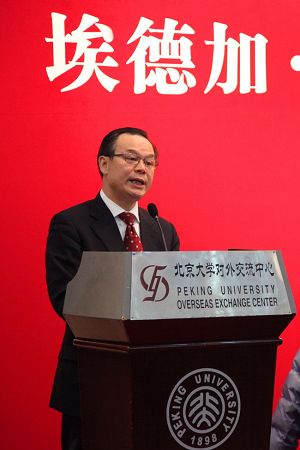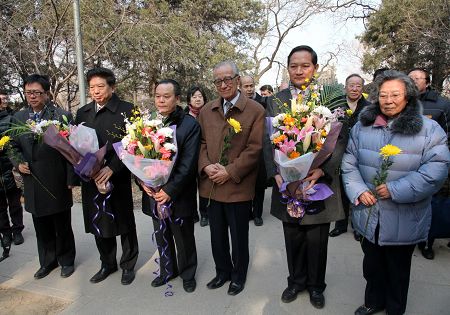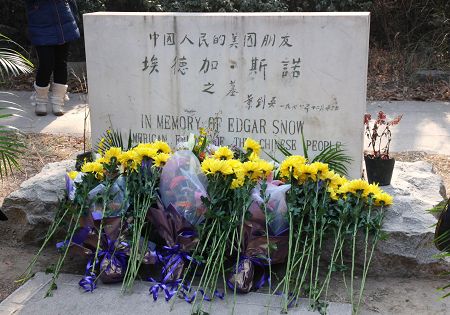Conference Commemorating the 40th Anniversary of Edgar Snow’s Death Held at Peking University
On February 15, the Conference Commemorating the 40th Anniversary of Edgar Snow’s Death was held at Peking University to honor his outstanding contribution to the enhancement of mutual understanding and the establishment of contacts between China and the United States. The conference was co-sponsored by China Society for People’s Friendship Studies and China Center for Edgar Snow Studies, Peking University. Zhou Qifeng, President of Peking University, Ma Canrong, President of the Society for People’s Friendship Studies, Huang Hua’s wife He Liliang, and Zhang Yifang, the doctor who went to Switzerland to treat Snow in 1972, addressed the conference. The conference was attended by Zhu Liang, former Minister of the International Department, Central Committee of CPC, Qian Yongnian, former Director of the Foreign Affairs Office of the State Council, Wang Xuezhen, former Secretary of the CPC Committee of Peking University and the First Director of China Center for Edgar Snow Studies, Zhang Kunsheng, Assistant Foreign Minister, and more than 50 well-known international friends, scholars, diplomats and representatives of PKU teachers and students. Dimond, Honorary President of Edgar Snow Memorial Foundation, Jim Hill, current President of Edgar Snow Memorial Foundation, Dr. Handy Williamson, Vice Provost at University of Missouri, where Snow studied, and Sheril Bischoff, Helen Foster Snow’s niece, sent congratulatory telegrams to this conference. The conference was chaired by Li Yansong, Vice President of Peking University and Director of China Center for Edgar Snow Studies.

Address by Zhou Qifeng, President of Peking University
After the conference, all participants paid tribute to the tomb of Edgar Snow and presented flowers.

The participants presented flowers in front of Edgar Snow’s tomb.

The tomb of Edgar Snow
Edgar Snow, a famous American journalist and an old friend of the Chinese people, was born on July 19, 1905. From 1928 to 1941, he spent most of his time in China. He was the first foreign reporter to go to the northern Shaanxi Soviet area to conduct systematic and in-depth interviews and give comprehensive coverage of the truth about the Communist Party of China and the Chinese Workers' and Peasants' Red Army to the rest of the world. Red Star Over China and other writings of him played an important part in history, showing the world the truth of the Chinese revolution. These books had a great impact home and abroad, boosting the morale of the Chinese military and civilians engaged in revolutionary struggles under difficult conditions. After the founding of the PRC, Snow visited China three times. With greater trust and expectation from Mao Zedong and Zhou Enlai, he conveyed the real information of the PRC that the West didn’t know and the thinking of China’s decision-makers to the US government and people, ultimately helping facilitate President Nixon’s ice-breaking tour and thus making historical contributions to the establishment of diplomatic relations between China and the US.
February 15, 2012 marked the 40th anniversary of the death of Mr. Edgar Snow. With his works transcending the times, he has become an international friend who will always be remembered and honored by the Chinese people. In the revolutionary years, Premier Zhou Enlai said of Snow: “For us, Snow is a great foreign writer and our best friend abroad.” In today’s era featuring China’s peaceful rise, Edgar Snow’s thoughts and works re-emerged with lasting appeal, which is of great significance to the promotion of the dialogue between China and the world in the new era. When the PRC celebrated its 60th anniversary in 2009, he was selected as one of the “heroes and models that have made outstanding contributions to the founding of new China” and top 10 international friends for “making exceptional contributions to the country in the past 100 years”. Both of the two selections carried weight, because they represented Chinese people’s respect and gratitude for Snow, and also demonstrated that his historical achievements will go down in history.
It was particularly important to hold such an event on the campus of Peking University, where Snow had worked, to commemorate the 40th anniversary of his death, because he was devoted to promoting Chinese culture and improving China-US relations all his life, forging an indissoluble bond with Peking University. In early 1934, Snow was invited to be a lecturer in the Department of Journalism, Yenching University, as a reporter for the Newsday in China. His journalism course was very popular among students. As he started to work at Yenching University, he asked Xiao Qian, who was studying at the Department of Journalism, to join him in translating and editing a collection of modern Chinese short stories Living China. They told stories about what was going on in China to the West through these novels. Snow cared very much about China’s well-being, and supported and protected with enthusiasm the patriotism of the students. His home was also a place frequented by many patriotic and progressive students. Following Snow’s suggestion, Student Self-Government Association of Yenching University held a press conference for foreign journalists, in which the students demonstrated the great significance of the December 9th Movement to the West. At the end of October 1936, after returning to Peiping from the Shaanxi-Gansu-Ningxia Border Region, Snow enthusiastically shared his experience in northern Shaanxi with the young students of Peking University, Tsinghua University, and Yenching University. In Lin Hu Xuan, he played the footage and slides he took that reflected the life in the Soviet area, and showed photos. Thanks to him, youngsters in the Kuomintang-controlled areas saw the images of the Red Army leaders such as Mao Zedong, Zhou Enlai, and Peng Dehuai, knowing “China under the Red Flag”. In Yan Garden, Snow completed the writing of Red Star Over China. After the founding of the PRC, Snow came to Beijing in June 1960, and came to Peking University to meet teachers, students and old friends. He stayed for 5 months. In his book The Other Side of the River published in 1963, he wrote: “National Peking University used to be the most important, as it cultivated the most important founders of the CPC. Today, Peking University is a place that attracts ambitious students and graduate researchers in art and science.” In 1964, Snow visited China again, returned to Yan Garden to meet professors and PKU students. Thanks to his special bond with Peking University, he built profound friendship with teachers and students of Peking University. On October 19, 1973, some of Edgar Snow’s ashes were buried by the Weiming Lake at the Peking University, as he wished during his lifetime: “I love China, I should like part of me to stay there after death as it always did during life.”
After Snow passed away, his tomb in Yan Garden has been frequented by PKU teachers and students as well as personnel from home and abroad, who came to pay their respects. PKU teachers and students have also wrote a lot of academic papers on Edgar Snow. Peking University has held many national-level commemorative and academic activities in memory of Edgar Snow. The Conference Commemorating the 10th Anniversary of Snow’s Death was held at Peking University in 1982. Six Edgar Snow Symposiums held in China since 1988 were hosted by Peking University. In 2005, Peking University successfully held “Understanding China: Centennial Commemoration of Edgar Snow’s Birth” International Symposium. On March 4, 1993, China Center for Edgar Snow Studies was established at Peking University. It started to systematically organize the symposiums and commemorations for the studies and introduction of Edgar Snow and other international friends, publish papers and books on the studies of these international friends, conduct friendly exchanges and communications with relevant institutions, organizations and people in the United States and other countries.

